- Home
- M. D. Lachlan
Valkyrie's Song Page 10
Valkyrie's Song Read online
Page 10
Behind him, Loys heard the boy’s footsteps pounding through the trees.
‘So will you come with us easily,’ said the rider called Guillame, ‘or shall we beat you and drag you?’
Loys saw no point in replying.
‘Take him! Gentian, Gilles, with me.’
Filocé kicked his horse forward. The animal hesitated, its steps stuttering before he mastered it. Loys threw back his head and screamed to the heavens, all the misery and anger of his many years pouring out of him. The horse fretted, kicked and span. Filocé shouted at it to calm down and tried to dismount but Loys cried out again and the animal jumped backwards on its rear legs, tossing Filocé down into the snow. The horse bolted. The Norman got up as the other riders dismounted and tried to tie their animals to trees.
‘A long way to the warm now, Filocé,’ said Loys. ‘Collect your horse and go home. I don’t want to kill you. There’s enough blood here.’
The Norman drew back his sword to strike. He was a big man, much taller than Loys. Loys tried to think of him as an opponent, not as so much sweating meat.
‘You, who never fought. You with your smashed hand and your pagan charms. You don’t want to kill me?’
He closed the ground between them. To Loys, free of the touch of the stone against his skin, the Norman seemed a lumbering and slow thing. He could run, he thought, but then he’d be leaving the boy to these men or to the cold. Filocé shouted and charged and the hostility found its echo in Loys. The sword swung its lazy arc but Loys turned his shoulder aside and let it pass him. He drove his knife into Filocé’s eye. Blood splattered over Loys’s face as the Norman grabbed at his shoulders and they grappled like old friends greeting. In an instant Filocé was a dead weight and Loys let him fall to the floor.
Loys licked at his lips. No. Blood. No. Loys. No. The wolf was free inside him. The Normans came screaming in, hacking and slashing. Loys tore and ripped, cracked joints, split bones, peeled flesh. His good fingers worked their way beneath skin to lift it like the crust from a pie, his bad fingers hardly troubling him. Elation rose up in him like the sun filling the shade of a morning valley. One man tried to run. Loys howled through the trees after him, the human who would have let him go torn away by the wolf who could not. He heard a tight, ecstatic rhythm and knew it was the beating of his own wolf ’s heart. Iron and salt were on his tongue and in his nose. The fleeing man turned an ankle on a tree root. He limped deliciously on, every step an enticement to murder. Loys did not kill him quickly but held him to the ground, feeling his panic, delighting in his struggle and his death.
He sat, hot-minded among the human debris. The sudden stillness lulled him and he toured the corpses, sniffing at each one, tasting the blood. No, Loys. No. Verses from the Bible were in his mind, the Greek he had heard echoing through the great Church of Holy Wisdom at Constantinople.
‘Heap on wood, kindle the fire, consume the flesh, and spice it well, and let the bones be burned. Then set it empty upon the coals thereof, that the brass of it may be hot, and may burn, and that the filthiness of it may be molten in it, that the scum of it may be consumed.’
‘Who pluck off their skin from off them, and their flesh from off their bones; who also eat the flesh of my people, and flay their skin from off them; and they break their bones, and chop them in pieces, as for the pot, and as flesh within the cauldron.’
Loys giggled, snot dribbling down his nose. He put his finger to the dribble, licked it. Blood. He picked flesh from his teeth. The beating in his breast grew weaker, slower.
‘Something wrong here, son.’ It was his own voice, speaking out loud.
The snow was red. ‘Is all snow red in this strange place?’ The words fell into him like a fish hook into water. Human thoughts nibbled around them, finally snagging, dragging to the surface of his mind.
Don’t do this, Loys. He fumbled in his boot, took out the pebble. Even the touch of it against his skin calmed him. He gazed about him, the snow blooming with blood. He felt sick at the sight, touched his mouth. No, Loys. He held the pebble tight. His right hand was still broken but it was already feeling better.
How long would it take him to transform, to become what he had been by the Dneiper? It need never happen with the stone against his skin. It would save him and he had done the most important thing: held it again.
The wolf ’s appetites devoured reason and while it commanded his thoughts, it seemed very odd to take up the stone, to turn his back on the odours of blood, the sizzling scent of panic, the cascading flavours of warm meat.
He tried to tie the thong back on but still couldn’t manage it. His reason returned; he was tempted to put the wolfstone in his pocket until his hand healed. How long would that take? A few days. But he might be lost to the wolf by then. The flesh of men fed it and it thrived upon it, growing more present physically and mentally with every morsel.
He pressed the pebble into his palm. If the horses were still there in the morning the wolf might be quiet enough inside him for him to ride one. First he returned to the fire to check it was still going. Then he followed Gylfa’s footprints through the trees.
The boy was easy to find, hiding on the bank of a frozen stream.
‘You’re alive!’ he said.
‘You need to tie this on me,’ said Loys, holding up the stone.
The boy took it. ‘You’re covered in blood.’
‘They were full of it,’ said Loys.
The boy stammered out a laugh but Loys hadn’t meant it as a joke. His mind felt heavy and leaden. Literal. The men had been full of blood and now they were mainly empty of it.
They walked back through the trees to the corpse field. Gylfa crossed himself.
‘By Thor’s great cock, you are a mighty man,’ he said.
He ran to the bodies and began stripping them for what he could find. He took rings and shirts, fine belts and the best sword, four purses. He offered it piece by piece to Loys but Loys turned his eyes away and Gylfa went back to rifling the bodies as if he feared they would wake up and ask for their possessions back if he wasn’t quick enough. He stood up, dressed in three cloaks, his fingers adorned with rings, two swords at his belt, four purses. He looked like a pirate and would last not a heartbeat if the Normans caught him like that.
‘I have a pair of boots that fit!’ said Gylfa. ‘Fine boots, fit for a lord.’ He extended a leg and flexed his toes.
From the south Loys heard something. A keening howl; a long tether of sound drawing him on. The boy had not heard it and just said he’d see if the Normans had any food on them.
They spent the night by the fire, wrapped in the clothes of the Normans. Gylfa tried not to stare at Loys but his eyes kept being drawn back to him.
‘What is that stone, sir?’
‘An anchor,’ said Loys.
‘For a tiny ship.’
‘I’m cursed by the fates,’ said Loys. ‘This stone keeps that curse away.’
‘Then it is powerful magic,’ said Gylfa.
‘It is the opposite of magic. It is its end.’
‘But sometimes you choose to be cursed. You remove the stone.’
Loys poked the fire.
‘Three women sit at the centre of the world, spinning out the fates of men. This is a pagan lie, or so I was led to believe. I have seen those women. The weft they weave is strong and subtle. You can try to break free of it but, even as you do, you will find you snare yourself more.’
‘I don’t understand you.’
Loys laughed. ‘To take two steps forward, sometimes you must take a step back. That’s all. I would throw off my curse, which means sometimes I must give in to it, just as a scholar who wishes to be a better debater must sometimes be bested to improve.’
‘I do not know what a debater is,’ said Gylfa.
Loys smiled. ‘There aren’t many in this land, son.’
They
slept as best they could, not bothering to move the corpses or their fire. They ate well from the Normans’ provisions – salted pork and dried apples.
Loys did not dream but he thought of that howl in his mind and what it meant. The girl he sought was near and he could find her. Until now he hadn’t even considered what she might be like – a fleeing Englishwoman, a Norman princess. There was no point. Long years had taught him that speculation was usually a waste of effort and it was better to consider only the possibilities he could affect. The English people had suffered, no doubt. He hoped she was a Norman – it would be much easier for her to survive. He heard the voice of the rune inside her, so she was still alive. But for how long, with the Norman armies swarming the land? He quelled his thoughts and watched the fire while he tried to sleep.
The next day Gylfa caught the horses and they headed south, towards the heavy horizon and Loys’s destiny.
14 Fog Spectres
They could not travel by day now but moved as wolves move, under the ice moon. Snow had fallen and frozen and the land was white, trees black against it like things wrought, not grown. Tola was glad to just keep moving. Columns of smoke lurked like demons in the moonlight – some from the burning villages, some from the houses and halls the Normans were using as bases. She could taste the fear here – acid and harsh, clamming her tongue to the roof of her mouth.
It was so cold and the distant fires mocked her – lit by industrious Normans toiling late into the sunset to destroy and burn. Shapes moved in the night – two terrified dogs running from the slaughter. The group clung to the hedgerows and slunk by walls and ditches. The sound of voices drifted clearly across the frozen air – Normans singing. Tola didn’t know the words but she was sure the song did not praise God.
They pressed through a small copse. It was trackless and the long grass soaked Tola’s skirt and leggings. The air here was brumous and she imagined that the whole land was on fire and the mist was its smoke.
One of the men spoke. ‘Here. We should stop here. There’s shelter enough and we might not be seen come tomorrow.’
‘We go on,’ said Ithamar. ‘This is open country. We can’t risk being seen.’
A noise sounded up in front of them and the whole band crouched, Tola included. Someone was coming. At first Tola thought it was some sort of creature native to York. It made a low whooping noise. Through the mist it appeared like a beast from a story, tall at the front, many legged at the back, a dark spider crawling through the forest. She felt its misery before she saw it clearly. It wasn’t a spider but a woman, pressing on through the copse with her children hanging off her skirts behind her. She was sobbing and all the children were sobbing as they staggered forward, crippled by the cold. She was not dressed for it – her mantle was wrapped about a girl child of around eight. There were three children – wrapped in blankets. Their mother had none.
When she saw Tola’s band she sank to her knees and cried out in despair. She thought they were Normans.
‘Don’t fear us, sister,’ said Tola.
The woman put up her hands to beg them. All the words had been burned out of her, along with her home and her livelihood, Tola guessed. Tola went to her, taking off one of the big Norman cloaks to wrap around her.
‘Tola, there is no time for this,’ said Ithamar. ‘We have to press on.’
‘They’re going to die if we don’t help them.’ Tola was already even colder without the cloak and could only imagine how the woman must be suffering. The woman was too numb even to be relieved. Tola saw images of despair when she looked at her – a well bubbling blood, not water; a table full of food that teemed with worms and flies; a wedding but the groom and bride dead on the floor, a union of corpses.
‘They’re going to die anyway,’ said Ceoluulf.
The woman let out a shriek at his words.
‘Tell her to shut up,’ said Ceoluulf. ‘Make her be quiet right now or she’ll have half the Norman army down on our heads.
‘Shush.’ Tola took her in her arms but the woman continued to sob. Her children too were all wailing. The youngest had a split in his shoe that Tola thought would cost him his leg if he didn’t get in front of a fire soon.
‘We need to go,’ said Ithamar. ‘Take back your cloak, Tola, I can’t have you die before I get you to our friends.’
‘We have to do something for them. They’re our people,’ said Tola.
‘They’re of York,’ said Ceoluulf. ‘No kin of mine.’
The woman tried to stifle her crying but great bubbles of anguish forced their way through her throat.
Ceoluulf drew his knife. ‘Three more breaths,’ he said. ‘If she can’t be silent, I will make her silent.’
At the sight of the knife the woman let out a great howl. Ceoluulf sprang at her but Tola came between them.
‘No.’
‘She’s going to get us killed.’ The children jabbered and wept. ‘Them too!’ He pointed with his knife.
‘Then you’ll need to prepare for heaven and having her blood on your hands will do you no good at all with our maker.’
‘I have enough already to send me to Hell.’
The breath of a horse. A word in a harsh foreign tongue.
‘They’re here!’
Ceoluulf grabbed Tola and bundled her down a bank. He held her flat on the frost-sharp grass. The woman and her children had not moved, the fear and the cold freezing them where they stood.
‘There are not many.’ Tola, her mind a wide and sensitive thing, thought there were only three horsemen at the most.
‘Not now, maybe, but there will be if we fight them’.
She heard a cry.
‘Hooo! La!’ Fear swept over her, so sharp she thought she might vomit.
Hooves beat the ground; she could almost feel them, so close were they.
She heard one word, screamed by the woman.
‘No!’
Then a thump. All the children howled. More thumping. Now silence.
Tola lay with her face to the cold earth.
The riders spoke to each other, the easy tones of men discussing a day’s harvest. The hooves went away.
Ceoluulf shoved her and silently reproved her with his eyes. ‘Next time,’ he seemed to say, ‘listen to me.’
They lay for a while until the thumping of their hearts subsided and they felt cold again. Tola was the first to rise. She saw Ithamar further down the bank.
She had to go back up to the bodies because she needed the cloak. They’d been killed quickly, at least there was that. She looked at the woman’s face. It was more peaceful now she was beyond the horrors of the night. Tola realised she was much younger than she had first thought. She might have been the children’s sister, not their mother. She took her cloak, wet with blood.
Ithamar put his hand on her shoulder.
‘At least you are going somewhere that you will learn to harness the magic in you and make these bastards pay for what they’ve done.’
‘Am I?’ said Tola.
He held her gaze and she felt his fear again. She saw it for what it was – not like the dead woman before her had felt at all. This was something he called into himself. It was a mask.
‘You are heading to betray me,’ she said.
‘No,’ said Ithamar.
‘Yes,’ she said.
She put the cloak about her. The blood would dry with the heat of her body.
‘If you’re so sure of that, why stay with us?’ said Ceoluulf.
‘Because there is the alternative,’ said Tola, looking down at the dead woman on the ground. ‘I cannot walk on alone. I will not sit here and die. So all I have is the company of treacherous men. You have a talent for staying alive, all of you. You were hunted by lords when King Harold reigned and no doubt Edward before him and you are still alive. With you I have the best chance
.’
‘Think how bad the world has grown when we’re someone’s best chance,’ said one of the men.
‘We should keep moving or we will freeze,’ she said.
The men moved on through the woods, the fog thickening as they went.
‘We must make camp soon,’ said Ceoluulf. ‘We could get stuck in the open and when this fog lifts I don’t need to tell you what could happen.’
‘We need to find our benefactor,’ said Ithamar.
‘This is ridiculous,’ said Ceoluulf. ‘I couldn’t find my cock in this brew if I didn’t know where it was.’
‘Are the woods enough cover?’ said Ithamar.
‘They’re going to have to be.’
Tola looked out into the flat, grey fog. Icefalls, a lover plunging a dagger into his father’s back for his refusal to let him wed, the wet smell of turf thrown up by the charge of horses, a light from afar guiding a traveller home. All of these things were out there, or rather their essence was, distilled in magical symbols that no fog could cloak, no night could hide.
She saw them in the dark, one made of fire, another of silver, still another that shone like a black horse’s back, another that was just a candle. No, not just a candle. All candles. All light that stands against the dark.
They spun slowly around a woman, their light illuminating her face. She was old, not as old as they were but she controlled them and directed them. They were not her servants but rather aspects of herself, indivisible from her.
‘You’re looking for a sorceress,’ said Tola.
Now Ithamar’s fear did prick. No mask, this, a real clench of the stomach, knee-tightening lurch.
‘Yes.’
Tola stepped into the mist and the men had no choice but to chase after her.
15 Two Witches
Styliane hated this cold country. All her life she had lived in the sun and, though Constantinople could be cold, the palaces were heated and she could be conveyed to social engagements in a palanquin, deep beneath furs. Here, she and her men needed to move stealthily. The runes were useful to her in this but she did not feel comfortable using them overmuch. At present, she had them under control. But if she allowed them to the forefront of her mind for too long they would take over, start calling for their sisters. At the point she allowed that, and the wish to become a god rose up in her, she would be lost as a person. Her brother, a century before, had lost control like that and the wolf had torn him, scattering his bright runes to the four winds. That was when they had entered her. She would not make the mistake he had made.

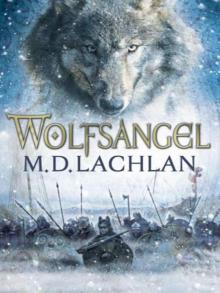 Wolfsangel
Wolfsangel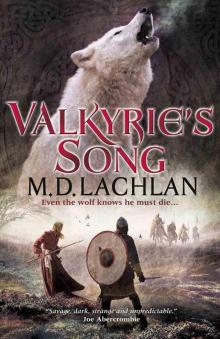 Valkyrie's Song
Valkyrie's Song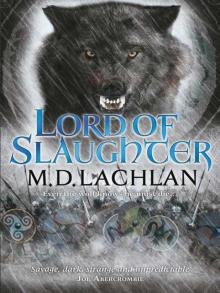 Lord of Slaughter
Lord of Slaughter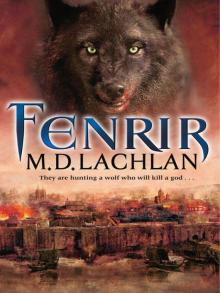 Fenrir c-2
Fenrir c-2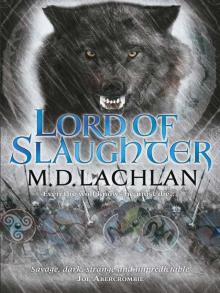 Lord of Slaughter (Claw Trilogy 3)
Lord of Slaughter (Claw Trilogy 3)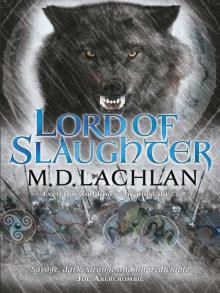 Lord of Slaughter c-3
Lord of Slaughter c-3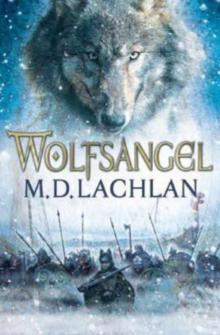 Wolfsangel c-1
Wolfsangel c-1